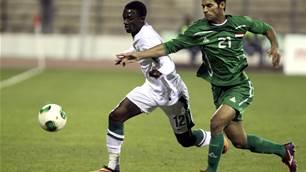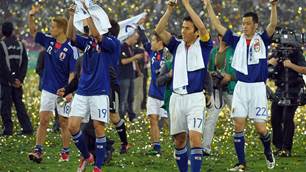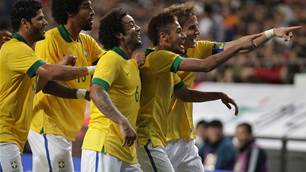The Koreans’ dream run through the 2002 World Cup symbolised the arrival of Asia on the world football stage.
Not only had Japan and South Korea hosted an extremely successful tournament, both sides performed where it mattered – on the field.
While the Japanese performed ably in reaching the second round, the Koreans knocked out Italy and Spain on their way to the semis. The AFC, home to half the world’s population and the most lucrative emerging football markets on the globe, had begun to realise its promise, and South Korea was its leader.
While the country stepped up to the challenge on the biggest stage of all, South Korea might have been a little embarrassed by its new-found reputation as Asian’s number one side. While a consistent performer at regional level, home to one of Asia’s most professionally administered domestic leagues and a provider of a steady stream of players excelling in Europe’s toughest competitions, South Korea has not won the Asian Cup since 1960.
Though they endured a frustrating 2006 World Cup, failing to progress past the group stage despite drawing with France and beating Togo, the country retains its status as one of Asia’s finest. The 2007 Asian Cup is an excellent chance for South Korea to correct this continental aberration and finally take out the trophy that has eluded it for almost 50 years.
That is, it was an excellent chance until the appearance at the tournament of the country’s two best players was thrown in doubt. Within two weeks in April, Manchester United midfielder Park Ji-Sung and Tottenham fullback Lee Young-Pyo both had surgery to fix knee problems. Park is almost certain to miss out, while Lee has only a slightly better chance of returning in time. Following such a significant blow, South Korea’s tournament odds have lengthened considerably, but the country remains one of the four or five that can realistically hope to lift the trophy.
South Korea will call upon several European-based players to carry the side. Lee Dong-Gook plays alongside Mark Viduka in attack at English Premier League side Middlesbrough. Having suffered a surprising omission from the 2002 World Cup squad and then missing the 2006 tournament through injury, Lee lacks no motivation for repeating his Asian Cup feats of 2000 when he finished top goal-scorer.
Seol Ki-Hyeon is another from the English Premier League, and one that has had a particularly memorable first season. The Reading winger was instrumental in his club’s excellent start to the season when he was the side’s main creative outlet. Although he received criticism for some lumbering play as the season wore on, Asian Cup defenders will still be anxious when faced with the tall Seol.
Following his departure at the end of the 2006 World Cup, Dick Advocaat took the job at Russian club Zenit St. Petersburg. His first moves were to sign left-back Kim Dong-Jin and midfielder Lee Ho. Kim provides an able replacement for Lee Young-Pyo on the left side of defence but may even be called to play in the centre, while Lee is favourite to start in a defensive midfield role.
The strong domestic K-League provides a solid foundation for the bulk of the side. Kim Do-Heon from Seongnam Ilwha Chunma – one of Adelaide’s conquerors in the ACL – is a technical attacking midfielder who will most likely replace Park Ji-Sung. Kim Nam-Il, the veteran holding midfielder and likely captain, will be desperate to take home the trophy in what may be his final major tournament.
Kim’s strong leadership has seen him recently criticise the European-based Korean players apparent lack of teamwork, accusing them of playing for themselves and coach Pim Verbeek has publicly supported Kim. “The moment some players get the ball, the fans go crazy so the players always want to show how good they are and they want to entertain. I told them, ‘Do that when it is 6-0’ and even then I think you should still play for the team,” he says. Yet a rift is unlikely within the very determined camp. “The European-based players are used to getting criticised. I think I was fair. I showed them and didn’t say anything stupid after the game by yelling or shouting.”
The first match against Saudi Arabia looms as a crunch match for South Korea. Historically, the side has particularly struggled against the West Asian contingent. Its four most recent Asian Cup campaigns have been ended twice each by Saudi Arabia and Iran.
As coach Verbeek says, “Saudi Arabia have a World Cup history and are one of Asia’s strongest teams. I know that [South] Korea lost twice against them in qualifying for the 2006 World Cup.” Second place in Group D plays its quarter-final against the top side from Group C – which is predicted to be Iran. For South Korea to even make the semi-finals then, it will have had to overcome at least one of its traditional bogey teams.
The South Koreans have arranged two friendlies, including one against the competitive Uzbekistan side, which should provide them with the necessary challenge to prepare for the important opening fixture. Despite the difficult draw, Verbeek remains optimistic. “I want to see South Korea as champions.”
FourFourTwo verdict
Reaching the semis will be an achievement in itself. However, without Park Ji-Sung, the trophy looks beyond them.
While the Japanese performed ably in reaching the second round, the Koreans knocked out Italy and Spain on their way to the semis. The AFC, home to half the world’s population and the most lucrative emerging football markets on the globe, had begun to realise its promise, and South Korea was its leader.
While the country stepped up to the challenge on the biggest stage of all, South Korea might have been a little embarrassed by its new-found reputation as Asian’s number one side. While a consistent performer at regional level, home to one of Asia’s most professionally administered domestic leagues and a provider of a steady stream of players excelling in Europe’s toughest competitions, South Korea has not won the Asian Cup since 1960.
Though they endured a frustrating 2006 World Cup, failing to progress past the group stage despite drawing with France and beating Togo, the country retains its status as one of Asia’s finest. The 2007 Asian Cup is an excellent chance for South Korea to correct this continental aberration and finally take out the trophy that has eluded it for almost 50 years.
That is, it was an excellent chance until the appearance at the tournament of the country’s two best players was thrown in doubt. Within two weeks in April, Manchester United midfielder Park Ji-Sung and Tottenham fullback Lee Young-Pyo both had surgery to fix knee problems. Park is almost certain to miss out, while Lee has only a slightly better chance of returning in time. Following such a significant blow, South Korea’s tournament odds have lengthened considerably, but the country remains one of the four or five that can realistically hope to lift the trophy.
South Korea will call upon several European-based players to carry the side. Lee Dong-Gook plays alongside Mark Viduka in attack at English Premier League side Middlesbrough. Having suffered a surprising omission from the 2002 World Cup squad and then missing the 2006 tournament through injury, Lee lacks no motivation for repeating his Asian Cup feats of 2000 when he finished top goal-scorer.
Seol Ki-Hyeon is another from the English Premier League, and one that has had a particularly memorable first season. The Reading winger was instrumental in his club’s excellent start to the season when he was the side’s main creative outlet. Although he received criticism for some lumbering play as the season wore on, Asian Cup defenders will still be anxious when faced with the tall Seol.
Following his departure at the end of the 2006 World Cup, Dick Advocaat took the job at Russian club Zenit St. Petersburg. His first moves were to sign left-back Kim Dong-Jin and midfielder Lee Ho. Kim provides an able replacement for Lee Young-Pyo on the left side of defence but may even be called to play in the centre, while Lee is favourite to start in a defensive midfield role.
The strong domestic K-League provides a solid foundation for the bulk of the side. Kim Do-Heon from Seongnam Ilwha Chunma – one of Adelaide’s conquerors in the ACL – is a technical attacking midfielder who will most likely replace Park Ji-Sung. Kim Nam-Il, the veteran holding midfielder and likely captain, will be desperate to take home the trophy in what may be his final major tournament.
Kim’s strong leadership has seen him recently criticise the European-based Korean players apparent lack of teamwork, accusing them of playing for themselves and coach Pim Verbeek has publicly supported Kim. “The moment some players get the ball, the fans go crazy so the players always want to show how good they are and they want to entertain. I told them, ‘Do that when it is 6-0’ and even then I think you should still play for the team,” he says. Yet a rift is unlikely within the very determined camp. “The European-based players are used to getting criticised. I think I was fair. I showed them and didn’t say anything stupid after the game by yelling or shouting.”
The first match against Saudi Arabia looms as a crunch match for South Korea. Historically, the side has particularly struggled against the West Asian contingent. Its four most recent Asian Cup campaigns have been ended twice each by Saudi Arabia and Iran.
As coach Verbeek says, “Saudi Arabia have a World Cup history and are one of Asia’s strongest teams. I know that [South] Korea lost twice against them in qualifying for the 2006 World Cup.” Second place in Group D plays its quarter-final against the top side from Group C – which is predicted to be Iran. For South Korea to even make the semi-finals then, it will have had to overcome at least one of its traditional bogey teams.
The South Koreans have arranged two friendlies, including one against the competitive Uzbekistan side, which should provide them with the necessary challenge to prepare for the important opening fixture. Despite the difficult draw, Verbeek remains optimistic. “I want to see South Korea as champions.”
FourFourTwo verdict
Reaching the semis will be an achievement in itself. However, without Park Ji-Sung, the trophy looks beyond them.
Related Articles

Asian Cup Qualifying: Trio make it to Australia

Saudi Arabia, UAE firm for 2015 Asian Cup













